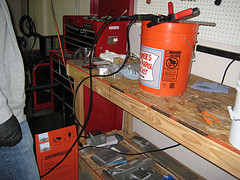A CNC wood router is a Numerical control tool that creates objects from wood. Parts of a project can be made and then assembled using a router to produce a complete project.
The CNC router works like a printer. Work is composed on a computer and then the design or drawing is sent to the CNC router for the hard copy. This outputs a 3-dimensional copy of the work. The CNC router uses a cutting tool instead of an ink jet.
The cutting tool is generally a router but other cutters can be used as well.
The CNC works on the Cartesian coordinate system (X, Y, Z) for 3D motion control. CNC stands for computer numerically controlled cutting tool. This gives the computer a printer like ability to drive a CNC machine to make parts.
For engraving and general purpose cutting all that is needed is some material to engrave or cut on and an engraving or cutting tool bit.
A file of a picture or part has to be converted to g-code. Clamp the work piece down and then use the driver program to zero the CNC and run the g-code file. This will command the CNC to make the desired parts for you, quickly and accurately. Use it for all kinds of projects to make PCBs, gears, molds, etc.
The CNC Router is great for hobbies, engineering prototyping, product development, art, robotic education, and production work.
How it works
A CNC wood router uses CNC (computer numerical control) and is similar to a metal CNC mill with the following differences:
àThe wood router typically spins faster — with a range of 13,000 to 24,000 RPM
àLow end hobby grade machines typically uses smaller tools — typical shank size 20 mm or at most 25 mm. Professional quality machines frequently use surface facing tools up to 3″ in diameter or more, and spindle power exceeding 15 horsepower. China Machines capable of routing heavy material at many hundreds of inches per minute are common.
àSome machines use smaller toolholders MK2 (Morse taper #2 – on older machines), ISO-30, HSK-63 or the tools just get held in a collet tool holder affixed directly to the spindle nose. ISO-30 and HSK-63 are rapid-change toolholding systems. HSK-63 has begun to supplant the ISO-30 as the rapid change standard in recent years.
A wood router is controlled in the same way as a metal mill, but there is a lot of CAM and CAD software like Artcam, Mastercam, Bobcad, and Featurecam specifically for wood routers.
Wood with different grain must be approached with unique strategies, and wood CAM software is less likely to need to have hog-out strategies than the metal ones. Wood routers are frequently used to machine other soft materials such as plastics at high speed.
Typical three-axis CNC wood routers are generally much bigger than their metal shop counterparts. 5′ x 5′, 4′ x 8′, and 5′ x 10′ are typical bed sizes for wood routers. But can be built to accommodate very large sizes up to, but not limited to 12′ x 100′. Most table routers use a three motor drive system (xyz) utilizing either servo or stepper motors that drive the router motor via a gantry system. The gantry system isolates the XYZ movement in the top part of the machine with a stationary table holding the workpiece. Many CNC metal mills have the cutter motor moving on the Z axis, and a table which moves in X and Y for added stability.
Many wood routers can run at machining speeds of 25 metres/min (linear) or faster with a few machines such as the Anderson capable of 40 metres/min, Onsrud capable of 86 metres/min.
For more information on CNC Wood Router you can visit http://www.homag-india.com/
This is Jon from Indian SEO, you can check Homag India Website for Woodworking machines.
